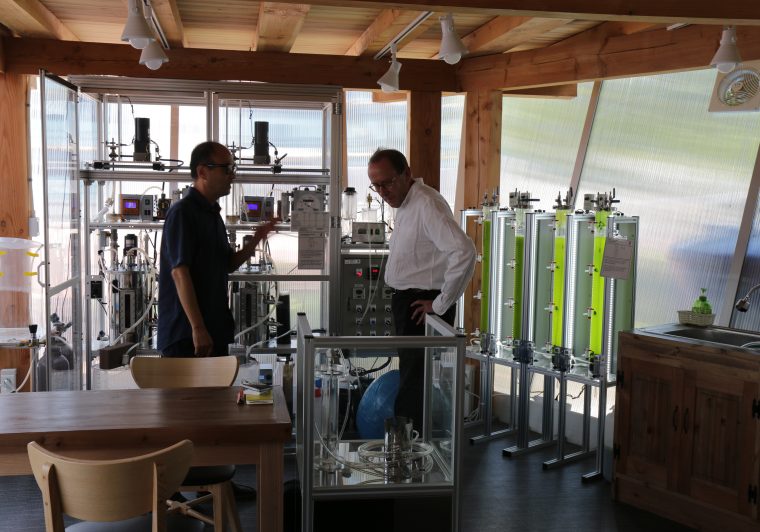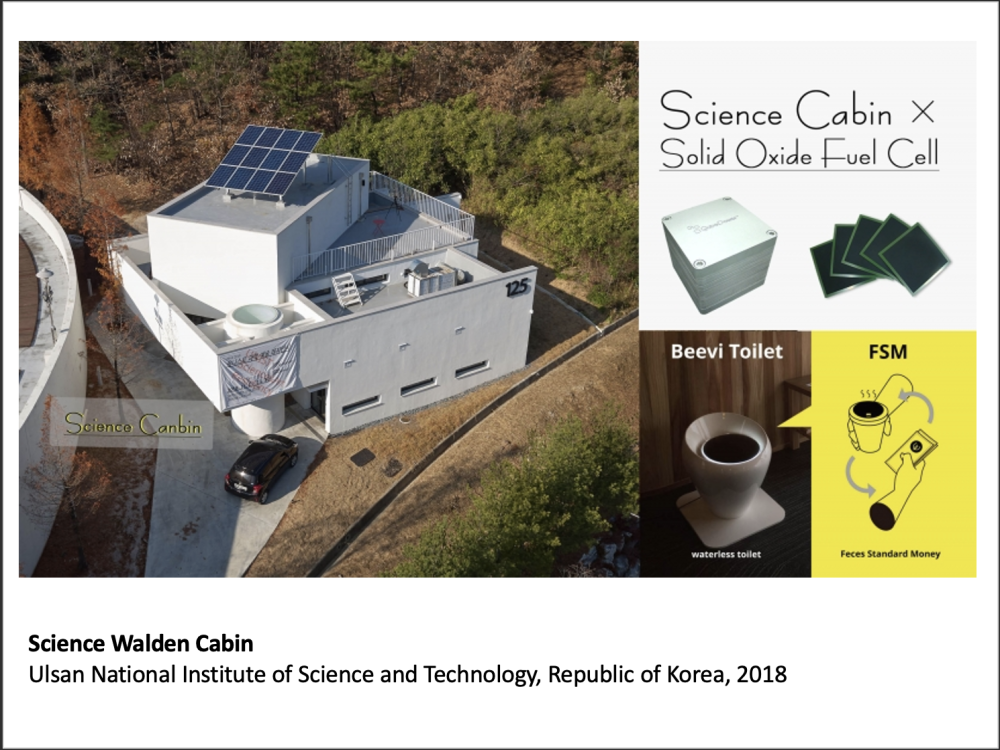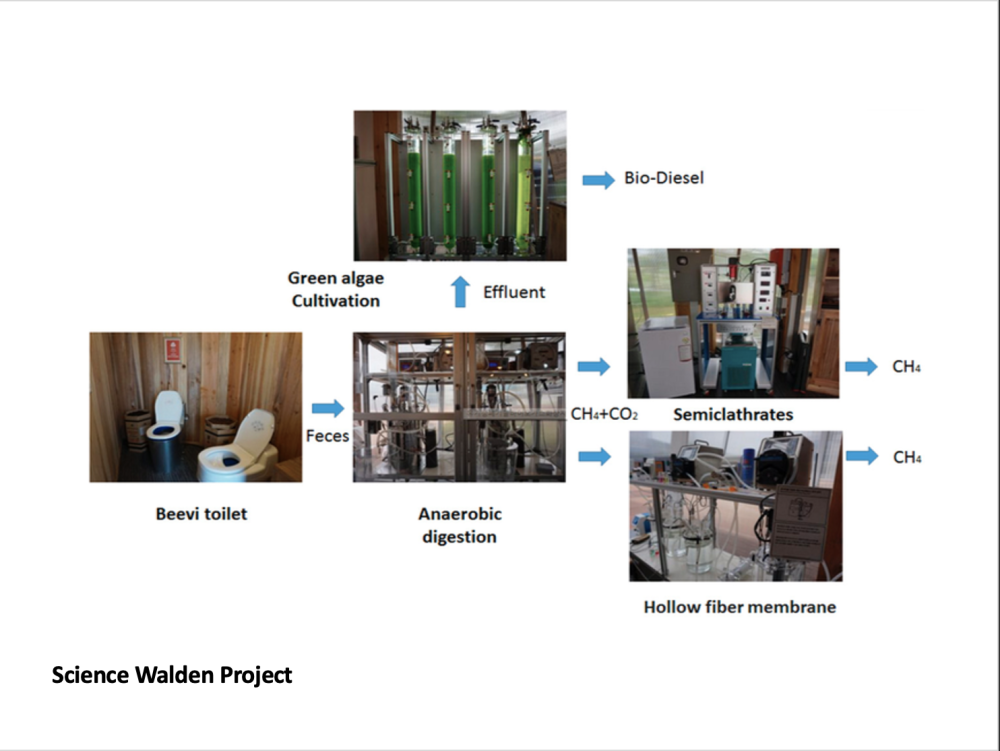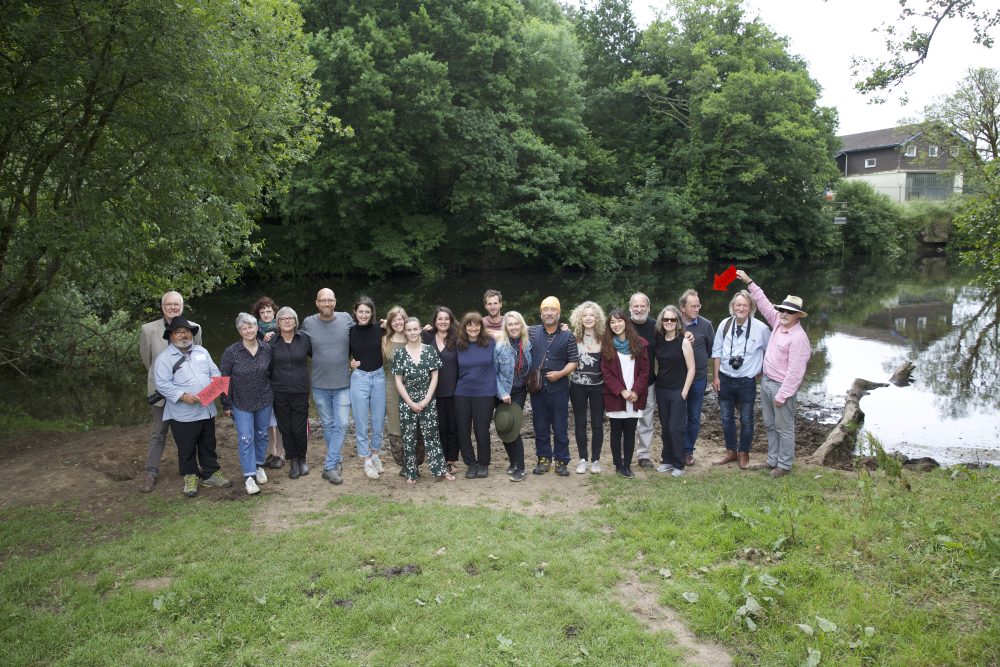2018-20
Science Walden Project
Whilst at Dartington, the most substantial programme that was developed from Clive’s contacts in South Korea was the Science Walden Project. Because an academic contract was required with UNIST, Richard Povall (because of his Doctorate) took the lead and this section describes the several symposia and publications he organised.
Image: Clive meets Professor Cho during the first phase of the Science Walden Project in Korea. Photo Martyn Windsor.

In early 2017, UNIST announced that funding of 10 billion KRW (£7 million) over seven years for the second phase of the Science Walden Project had been secured. Dr Hyun Kyung Lee, one of the committee members of the SWP, visited us in June 2017 and a three year collaborative research project between CCANW and UNIST from 2018-20 was proposed.
After exploring several different options, it was proposed in August 2017 that UNIST would pay up to £81,300 over three years 2018-20. The contract was subject to annual renewal and concluded several months early.
Because of administrative complexity, the contract was technically only signed in May 2019 and it covered a period between March 2019 and February 2020. This was an academic contract and required a lead researcher with a Doctorate to be appointed as a Visiting Professor within UNIST, so Richard Povall took on this role. Payments were made monthly into the CCANW account.
The relationship was rich in outcomes even though Richard (due to health issues) did not travel to Korea during this time.
The genesis of Science Walden
Science Walden was (the project ended in 2022 at UNIST) a grand and radical vision, its name growing from H.D.Thoreau’s 1854 book Walden Pond (essentially a hymn to solitude, self-sufficiency and nature) and from B.F.Skinner’s 1965 fictional utopia Walden Two. Science Walden was conceptually a kind of Walden Three, marrying nature, environment, art and science.
The heart of the Science Walden Project lay in its development of the BeeVi toilet, a waterless toilet (a high-tech composting toilet) that produced usable soil compost from human faeces. The toilet itself was perhaps not entirely revolutionary, but the utopian concept went much farther. Because the system was designed to turn poo into (in effect) energy, this meant that what we typically consider ‘waste’ that we flush away (using billions of cubic litres of potable water) it was instead a commodity of value.

In a building/community/country using this system universally, each person is paid in a virtual currency – 10 Ggool – every day. The name of the currency is unfortunate in English, but actually translates into something more like ‘honey’ so where it has been adopted in English the currency became known as ‘Honey Money’ which sounds rather more mellifluous to the English-speaking world than ‘Ggool’.

So this, in effect, is a form of universal basic income. You are paid to poo. But the project took one step further into utopianism: you could use your Ggool to purchase goods and services, but you were also encouraged to give away a percentage of your Ggool to others. Unlike fiat currencies (currencies officially sanctioned by their national governments), Ggool carry a negative interest rate: hold on to them (in the capitalist model) and they lose value; give them away (an altruistic model) and you are likely to be given Ggool by others.
Within this model, science knowledge and art knowledge carry equal weight and Ggool can be used to purchase art as well as the products of science: objects and technology.
This hard-to-explain revolutionary idea was ultimately supported by the Korean Government for almost ten years, which is extraordinary given the innate conservatism of that government.
The income from our involvement with Science Walden supported numerous activities including a number of international symposia run by art.earth. These included:
November 2017
Feeding the Insatiable
A three-day symposium produced by art.earth focusing on alternative energy and recyclables and how artists are addressing energy use. Held at Dartington Hall.
June 2017
In Other Tongues
Another art.earth symposium focusing on the non-human. Held at Dartington. Publication available.
9-18 June 2018
Global Nomadic Art Project – The Ephemeral River
A co-production of art.earth and CCANW, this saw 16 artists from eight countries (five from Korea, six from UK, five from elsewhere) come together at Dartington Hall for ten days intensive residency with a particular focus on the River Dart which runs through the Dartington Estate, and on water in general.

The Global Nomadic Art Project (GNAP) was a long-running series of gatherings, happening in a different country each year, coordinated by Yatoo, the first of CCANW’s Korean partners. This was the first GNAP to happen in the UK and in many ways was the culmination of the long-nourished relationship with Korea and Yatoo. Publication available.
June 2018
Liquidscapes
Immediately following on from The Ephemeral River residency was another in the series of art.earth symposia supported in part by Science Walden. This three-day event had a focus on water from widely differing perspectives and also spawned a publication. An eBook is now available.
December 2018
New Order, New Values, New Economics at Festival for the Earth, Venice
This involved an invitation to students from Science Walden’s MA Convergence of Science and Arts to offer a presentation about their research work. As Visiting Professor, Richard Povall supported the students and chaired the presentation in Venice.
November 2019
Culture, Community and Climate
A week-long residency of artist-scientist collaborators which was followed immediately by a one day forum. Dey Kim and Dongyoung attended from Science Walden. An eBook containing conversations between the sets of collaborators is still available.
Book published 2020
Honey Money: fSM – new money for a new society
A collaboration between Science Walden’s Professor Jaeweon Cho and Richard, Honey Money tells the story of the Ggool (which roughly translates as ‘Honey Money’ and its philosophical and political roots as an alternative currency supporting an alternative society. Publication available.
Book published 2022
Cyber Walden: Walden Two through a 21stC lens
The final publication from this collaboration came from Bodgan Albina, a student at Science Walden, translated by Richard Povall. The book expands on some of the philosophical ideas underlying the creation of Science Walden (which itself was occasionally known as Walden Three). This book explores what it means to introduce the alternative society ideas as laid out in B.F.Skinner’s Walden Two in a technological age. A eBook is available.
Richard Povall and Clive Adams.
Next Page
Global Network of Water Museums
